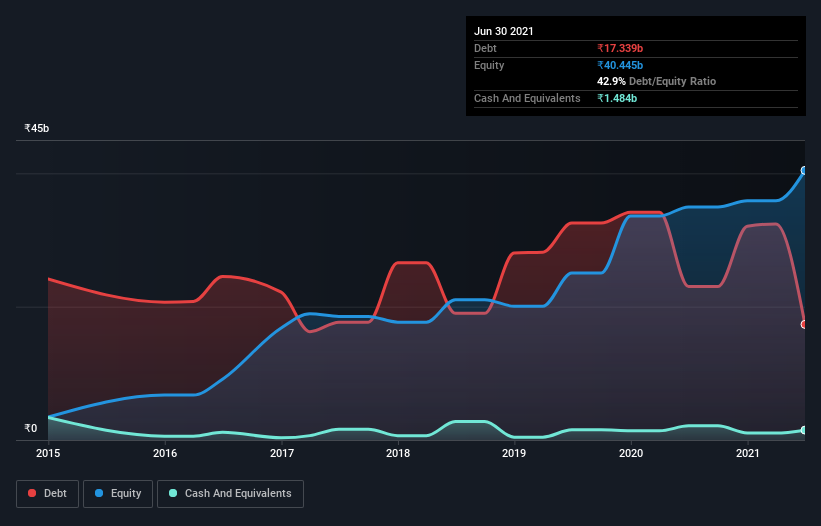Stock Analysis

Some say volatility, rather than debt, is the best way to think about risk as an investor, but Warren Buffett famously said that 'Volatility is far from synonymous with risk.' So it might be obvious that you need to consider debt, when you think about how risky any given stock is, because too much debt can sink a company. As with many other companies Varun Beverages Limited (NSE:VBL) makes use of debt. But the real question is whether this debt is making the company risky.
When Is Debt Dangerous?
Debt is a tool to help businesses grow, but if a business is incapable of paying off its lenders, then it exists at their mercy. Ultimately, if the company can't fulfill its legal obligations to repay debt, shareholders could walk away with nothing. While that is not too common, we often do see indebted companies permanently diluting shareholders because lenders force them to raise capital at a distressed price. By replacing dilution, though, debt can be an extremely good tool for businesses that need capital to invest in growth at high rates of return. The first thing to do when considering how much debt a business uses is to look at its cash and debt together.
See our latest analysis for Varun Beverages
How Much Debt Does Varun Beverages Carry?
As you can see below, Varun Beverages had ₹17.3b of debt at June 2021, down from ₹23.0b a year prior. However, because it has a cash reserve of ₹1.48b, its net debt is less, at about ₹15.9b.

How Healthy Is Varun Beverages' Balance Sheet?
According to the last reported balance sheet, Varun Beverages had liabilities of ₹29.4b due within 12 months, and liabilities of ₹18.2b due beyond 12 months. Offsetting this, it had ₹1.48b in cash and ₹5.01b in receivables that were due within 12 months. So it has liabilities totalling ₹41.1b more than its cash and near-term receivables, combined.
Since publicly traded Varun Beverages shares are worth a total of ₹397.4b, it seems unlikely that this level of liabilities would be a major threat. But there are sufficient liabilities that we would certainly recommend shareholders continue to monitor the balance sheet, going forward.
In order to size up a company's debt relative to its earnings, we calculate its net debt divided by its earnings before interest, tax, depreciation, and amortization (EBITDA) and its earnings before interest and tax (EBIT) divided by its interest expense (its interest cover). Thus we consider debt relative to earnings both with and without depreciation and amortization expenses.
While Varun Beverages's low debt to EBITDA ratio of 1.0 suggests only modest use of debt, the fact that EBIT only covered the interest expense by 4.7 times last year does give us pause. But the interest payments are certainly sufficient to have us thinking about how affordable its debt is. Importantly, Varun Beverages grew its EBIT by 47% over the last twelve months, and that growth will make it easier to handle its debt. The balance sheet is clearly the area to focus on when you are analysing debt. But it is future earnings, more than anything, that will determine Varun Beverages's ability to maintain a healthy balance sheet going forward. So if you're focused on the future you can check out this free report showing analyst profit forecasts.
Finally, a business needs free cash flow to pay off debt; accounting profits just don't cut it. So it's worth checking how much of that EBIT is backed by free cash flow. In the last three years, Varun Beverages's free cash flow amounted to 49% of its EBIT, less than we'd expect. That's not great, when it comes to paying down debt.
Our View
Happily, Varun Beverages's impressive EBIT growth rate implies it has the upper hand on its debt. And we also thought its net debt to EBITDA was a positive. When we consider the range of factors above, it looks like Varun Beverages is pretty sensible with its use of debt. That means they are taking on a bit more risk, in the hope of boosting shareholder returns. There's no doubt that we learn most about debt from the balance sheet. But ultimately, every company can contain risks that exist outside of the balance sheet. For instance, we've identified 2 warning signs for Varun Beverages that you should be aware of.
When all is said and done, sometimes its easier to focus on companies that don't even need debt. Readers can access a list of growth stocks with zero net debt 100% free, right now.
When trading Varun Beverages or any other investment, use the platform considered by many to be the Professional's Gateway to the Worlds Market, Interactive Brokers. You get the lowest-cost* trading on stocks, options, futures, forex, bonds and funds worldwide from a single integrated account. Promoted
Valuation is complex, but we're helping make it simple.
Find out whether Varun Beverages is potentially over or undervalued by checking out our comprehensive analysis, which includes fair value estimates, risks and warnings, dividends, insider transactions and financial health.
View the Free AnalysisThis article by Simply Wall St is general in nature. We provide commentary based on historical data and analyst forecasts only using an unbiased methodology and our articles are not intended to be financial advice. It does not constitute a recommendation to buy or sell any stock, and does not take account of your objectives, or your financial situation. We aim to bring you long-term focused analysis driven by fundamental data. Note that our analysis may not factor in the latest price-sensitive company announcements or qualitative material. Simply Wall St has no position in any stocks mentioned.
*Interactive Brokers Rated Lowest Cost Broker by StockBrokers.com Annual Online Review 2020
Have feedback on this article? Concerned about the content? Get in touch with us directly. Alternatively, email editorial-team (at) simplywallst.com.
About NSEI:VBL
Varun Beverages
Operates as the franchisee of carbonated soft drinks (CSDs) and non-carbonated beverages (NCBs) sold under trademarks owned by PepsiCo.
High growth potential with solid track record.

